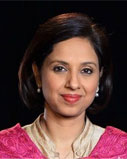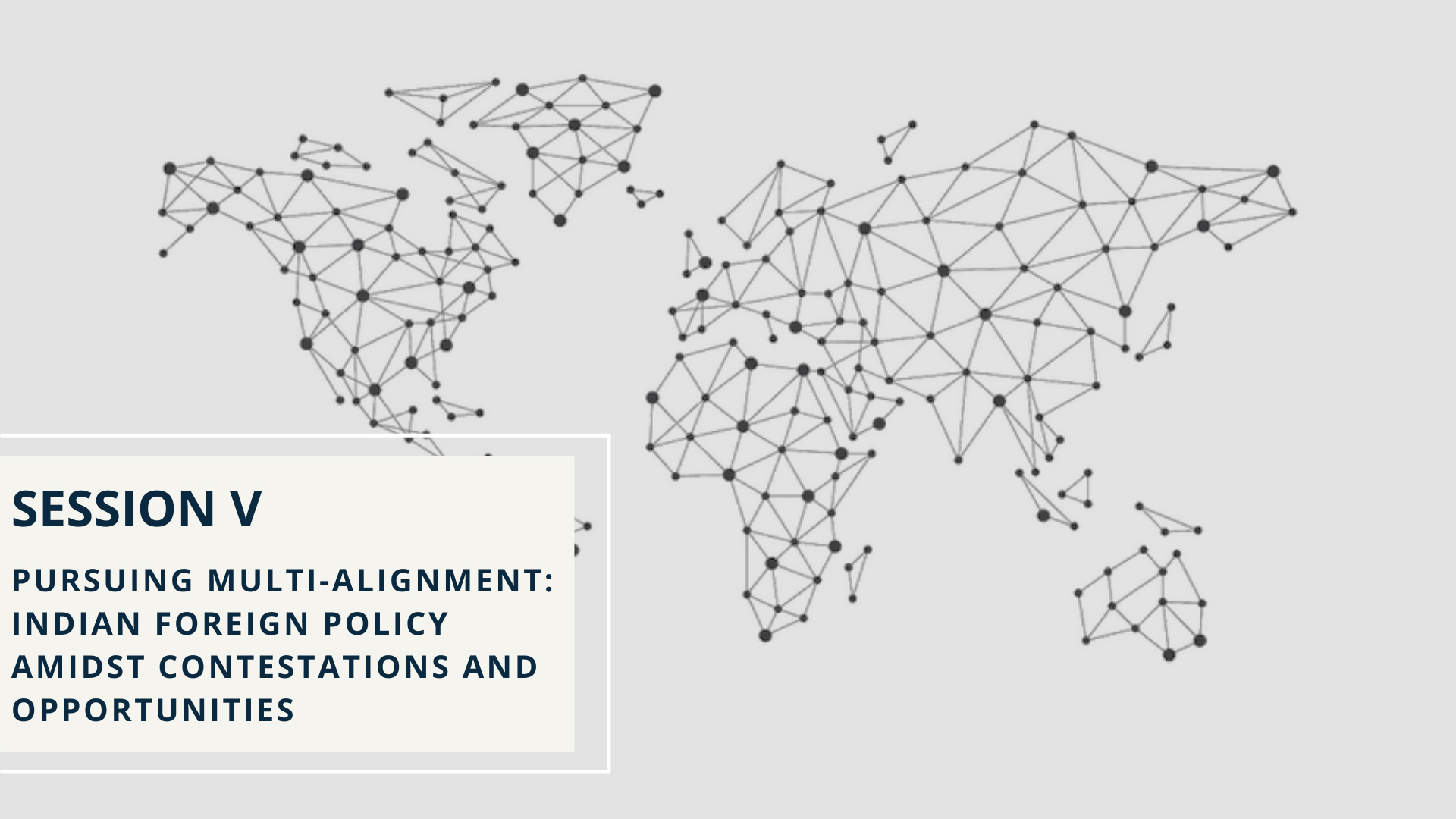SESSION V
PURSUING MULTI-ALIGNMENT:
INDIAN FOREIGN POLICY AMIDST CONTESTATIONS AND OPPORTUNITIES
In a multi-polar world, exertion of India's sphere of influence has an
immediate causal relationship with its identification of international
challenges and economic prospects, and its flexibility in responding to a
variety of situations. India's determination to go beyond an inward-looking
approach, to adoption of more outward multi-alignment based measures in
security, management of the global commons, and trade is of paramount
importance.
For India, "moving from past dogmatic approaches" in foreign policy, and
"taking risks is inherent to the realization of ambitions" - S. Jai shankar
(2019). With the demise of a unipolar world order and the emergence of
multipolarity, India saw benefits in working with different nations on a
variety of issues. This resulted in India's state of play positing the US and
China as significant actors in the strategic and economic domain while
holding Russia at a new vantage point considering its strategic presence in
Eurasia.
India's recognition of issue-based arrangements in a converging
international order resulted in its diplomatic engagements with the US on
the US-India Nuclear deal, and its stance against the Taliban in Afghanistan.
India renewed partner ships with Russia in the defence and trade sector
while rebuilding BRICS into a major forum, and improved trade ties with
China while endorsing climate change negotiations. Moreover, a departure
from the traditional foreign policy dogmas has seen new diplomatic
collaborations in the form of the Quad ( Japan, Australia, India and the
United States ), the RIC (Russia-India-China) forum, and the JAI ( Japan-
America-India) groupings.
In the security domain, India is a major nuclear power, currently fostering a
civil nuclear cooperation with the US, China and other countries of the NSG.
The security policy under the India-EU-Agenda for Act ion 2020 al so
highlighted Indian commitment to counter-terrorism, cyber security and
threats to mari time security. In this regard, harnessing the powerful Franco-
British alignment in defence is an as set for India. During the virtual summit
held in July 2020, Indian Prime Minister Narendra Modi called for "action-
oriented" agenda and also promoted India-EU partnerships in "economic
reconstruction and in building a human-centric globalization." Further,
India's renewed foreign policy push in the Islamic world is viewed from its
balance of three poles of power- Israel, Iran and Saudi Arabia.
India's out reach to fight terror in Saudi Arabia and UAE, fostering of
defence and technological partner ships with Israel, protection of Chabahar
investments in Tehran amidst the American pressure- reiterates India's
focus on peace in West Asia.
Interlinked with security, India's commitment towards the management of
global commons can be seen through its interests in the Indo-Pacific (IP),
Indian Ocean Region (IOR), preservation of human rights, and in becoming
an active member of the Paris Climate Change Agreement. India's mari time
strategy and increased over seas investment and trade in the IP has seen
mari time exchanges between the ASEAN countries and the Pacific Island
Countries-striking a fair balance between its "Look West" and "Act East"
policy. Further, in the IOR, New Delhi has spelt out its blue economy
objectives in keeping with its Security and Growth for All in the Region
(SAGAR) doctrine.
Finally, pursuing multi-alignment in the economic space is critical for
India's growth, and it must look at alternative economic par tnerships while
stepping up its role with existing partners. India is the largest arms
importer in the world with most of its defence equipment and weaponry
coming from Russia, followed by cooperation in the hydrocarbons and
energy sector. The relevance of the US and Europe in technology transfer
and supply of high-tech-military equipment is also vital in India's defence
trade. Further, Indian oil and energy demands have increased over seas
investments in the Gulf-Iran, Saudi Arabia and the UAE, and in Latin
America-Venezuela, Brazil and Panama. India's large-scale investments in
national development and private sector trade in Africa, and increased
support for trade and migration with the SAARC countries, explicates
India's South-South cooperation objectives. From among the G20 countries,
the UK is the largest investor in India. The post-Brexit scenario and its
implications on mutual investments of the two countries therefore become
an important element of introspection for India's foreign policy.
The future of Indian foreign policy, therefore, needs to look "globally" and
act "locally", in order to assert itself as a regional and a global power, in a
competing and converging world order.
AGENDA
DAY II
FRIDAY 30 APRIL 2021
|
03:30 PM - 04:30 PM
- PURSUING MULTI-ALIGNMENT: INDIAN FOREIGN POLICY AMIDST CONTESTATIONS AND OPPORTUNITIES
CHAIR

Ms. Suhasini Haidar
Ms. Suhasini Haidar is the Diplomatic and National Editor at
The Hindu. Prior to this, Ms. Haidar was a senior editor and
prime time anchor for India's leading 24-hour English news
channel CNN-IBN, and also hosted the signature show, 'World
View with Suhasini Haidar'. Over the course of her career, Ms.
Haidar has covered the most challenging stories and conflicts
from Pakistan, Sri Lanka, Libya, Lebanon and Syria. In India,
she has covered the external affairs beat for over a decade
and her domestic assignments include in-depth reportage from
Kashmir.
In 2011 she won the Indian Television Academy-GR8! Award for
'Global news coverage', and the Exchange4Media 'Enba' Award
for best spot news reporting from Libya. In 2010, she won the
NewsTelevision NT 'Best TV News Presenter' Award. Ms. Haidar
writes regularly on India's foreign policy and has contributed
to several books on the subject and is a public speaker on
international affairs and journalism.
SPEAKERS

Prof. Harsh V.Pant
Professor Harsh V Pant is Director, Studies and Head of the Strategic Studies Programme at Observer Research Foundation, New Delhi. He holds a joint appointment with the Department of Defence Studies and King's India Institute as Professor of International Relations at King’s College London. He is also a Non-Resident Fellow with the Wadhwani Chair in US-India Policy Studies at the Center for Strategic and International Studies, Washington, DC. Professor Pant has been a Visiting Professor at the Indian Institute of Management, Bangalore; a Visiting Fellow at the Center for the Advanced Study of India, University of Pennsylvania; a Visiting Scholar at the Center for International Peace and Security Studies, McGill University; and an Emerging Leaders Fellow at the Australia-India Institute, University of Melbourne.

Mr. Shashidhar K.J.
Mr. Shashidhar K.J. is Associate Fellow at ORF’s Mumbai centre. He works on the broad themes of technology and financial technology. His key areas of research look at the intersection of telecommunications, technology and media, evolution of financial technology, digital payment systems and net neutrality. Mr. Shashidhar has been a technology journalist with over seven years of experience with leading newspapers and publications. He was keenly involved in the net neutrality debate while working with MediaNama and helped with crafting responses to the Telecom Regulatory Authority of India’s consultation paper on the same.

Dr. Alvite Ningthoujam
Dr. Alvite Singh Ningthoujam is an Assistant Professor at the Symbiosis School of International Studies (SSIS), Symbiosis International (Deemed University), Pune. He holds Ph. D., from the Centre for West Asian Studies, School of International Studies, Jawaharlal Nehru University, New Delhi. From July 2017 to July 2019, he served as a Consultant at the Strategic Affairs Wing of the National Security Council Secretariat, Prime Minister’s Office, New Delhi. Prior to this, he was a Senior Research Associate at Vivekananda International Foundation, New Delhi, where he focused on issues pertaining to the Middle East and trends and developments in International Terrorism, particularly focusing on the Islamic State of Syria and Iraq (ISIS)/Daesh, and its footprints in India, South Asia and Southeast Asia.

.png)
